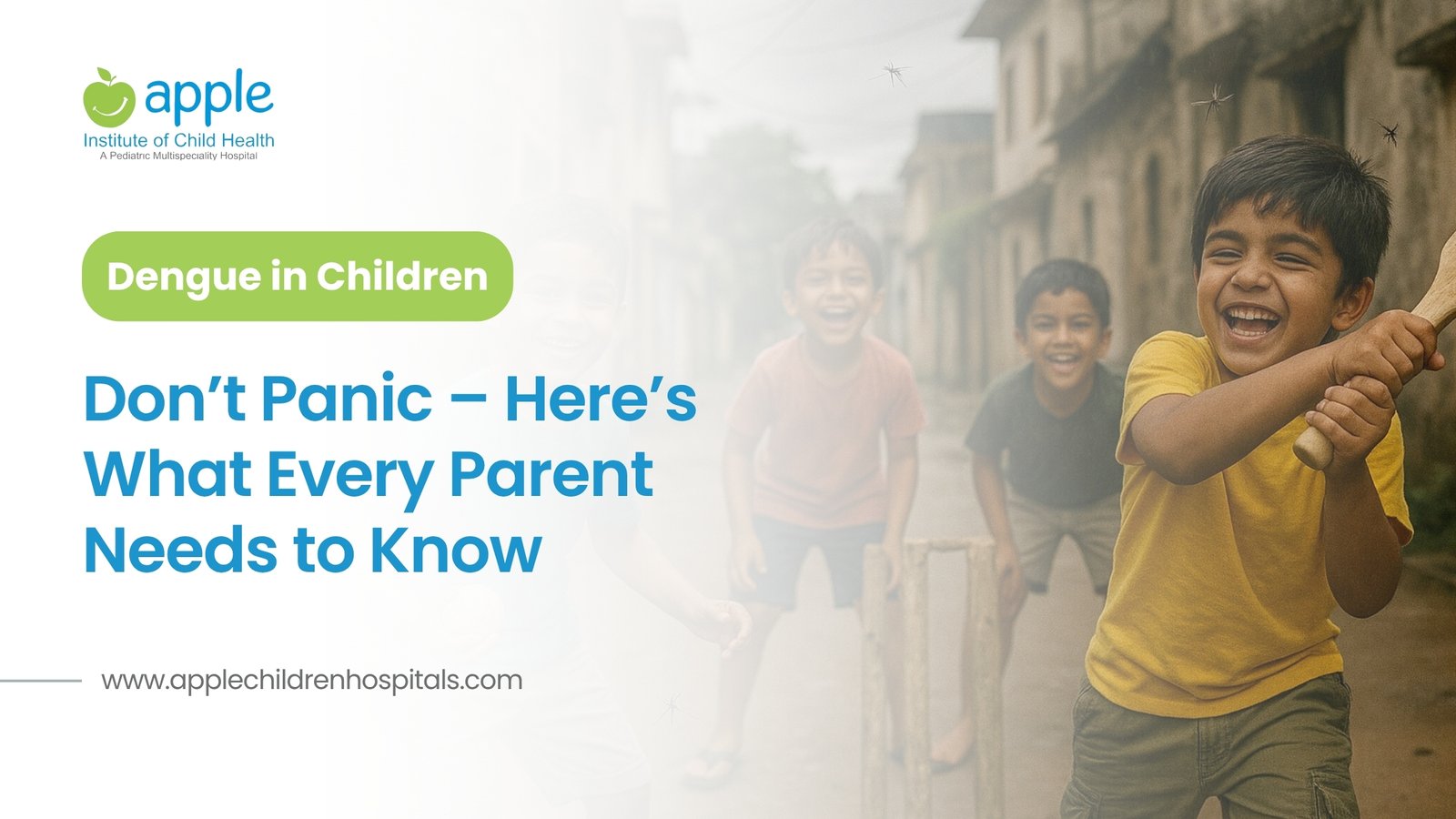Every monsoon, the word “Dengue” starts trending in homes, schools, and WhatsApp groups – and naturally, parents begin to worry.
But here’s the truth most people don’t tell you:
- Not every Dengue case is dangerous.
- Most children recover fully with rest, fluids, and basic care.
- Only a small number develop complications – and even those can be managed if caught early.
This article will help you understand the real facts, clear the confusion around platelets, and most importantly – help you know when to visit the pediatric hospital near by and when home care is enough.
What Exactly is Dengue?
Dengue is a viral infection spread by mosquitoes. In children, it usually starts with:
- Fever
- Mild cold or cough
- Headache or body ache
- Tiredness
- Nausea, vomiting, or tummy pain
It’s often confused with Typhoid or Malaria – but unlike those, Dengue has no specific medicine. It’s a self-limiting illness, meaning your child’s body will recover on its own – usually within 4 to 14 days, depending on immunity.
“My Child’s Platelet Count is Low – Is It Serious?”
We often read in newspapers and see WhatsApp forwards about Dengue patients having dangerously low platelet counts. This creates a lot of panic in families and societies — especially when we hear numbers like “Only 20,000 platelets left!”
But here’s what parents must know:
Yes, platelet counts do drop — sometimes to as low as 10,000–50,000 — during the active phase of Dengue.
But that doesn’t always mean it’s severe or life-threatening.
In most cases:
- The drop is temporary
- The body recovers on its own
- Blood (platelet) transfusions are rarely needed
You also don’t need to rush for expensive treatments in most cases.
The focus should be on rest, fluids, and regular monitoring, not just the platelet number.
How to Treat Dengue at Home (When It’s Mild)
First things first – always consult your pediatrician before managing Dengue at home.
Even if the symptoms seem mild, only a doctor can confirm whether home care is safe for your child.
If your pediatrician confirms that it’s okay to manage at home, here’s what you should focus on:
- Give plenty of rest – don’t underestimate this!
- Use Paracetamol (as prescribed) for fever – avoid other medications
- Offer fluids with salt & sugar – like ORS, nimbu paani, coconut water
- Serve light, nutritious meals
Monitoring your child closely during recovery is key – and don’t hesitate to revisit the children’s doctor if anything feels off.
The Real Risk: Circulatory Disturbance (What You Must Watch For)
While most Dengue cases in children are mild and manageable at home with proper rest and fluids and guidance of the expert children’s doctor, there’s one serious complication that every parent should be aware of — disturbance in blood circulation.
This typically shows up between Day 3 to Day 6 of illness and can range from mild dizziness to more serious issues requiring hospitalization.
But here’s the good news:
- Only a small percentage of children experience this complication
- Early medical attention can prevent things from getting worse
That’s why regular check-ins with your pediatrician — even during home care — are absolutely essential.
Red Flag Symptoms: When to Visit the Hospital Immediately
Please don’t wait or try home remedies if your child shows any of these signs. These could indicate serious complications:
- Swelling on the face or legs
- Feeling faint or blackout while getting up
- Giddiness or unsteady movement
- Very little or dark yellow urine (especially if not passed for 4+ hours)
- Excessive sleepiness or hard to wake up
- Bleeding – from gums, nose, stool, or any part of the body
- Blood-red tiny dots or rashes on the skin, especially if increasing
- Severe headache, high fever, or persistent vomiting
These symptoms are not to be ignored. Immediate pediatric evaluation or hospital admission may be required.
Still Confused or Worried? We’re Just a Call Away.
At our Children Hospital in Ahmedabad, we understand how stressful it can be when your child is unwell — especially with something like Dengue. That’s why our expert pediatricians are available across all branches to guide you, whether it’s a basic consultation or an emergency admission.
Even if it’s just a doubt about symptoms or reports — don’t wait and wonder. Contact Us Now!


